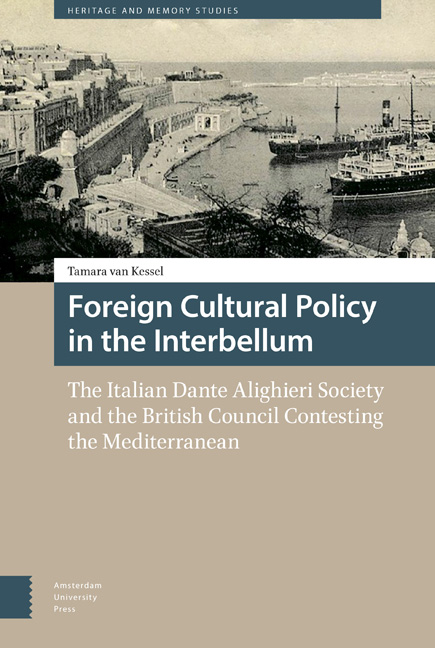 Foreign Cultural Policy in the Interbellum
Foreign Cultural Policy in the Interbellum Book contents
- Frontmatter
- Contents
- List of Illustrations
- Introduction
- 1 The Development of Foreign Cultural Policy
- 2 The Dante Alighieri Society and the British Council: Agency and Independence
- 3 Constructions of ‘Italianità’ and ‘Britishness’
- 4 The Battle for Cultural Hegemony in Malta
- 5 National Culture and Imperial Conquest: The Dante Alighieri Society in Abyssinia and the British Council in Egypt
- Conclusion
- Acknowledgements
- Bibliography
- Index
1 - The Development of Foreign Cultural Policy
Published online by Cambridge University Press: 12 February 2021
- Frontmatter
- Contents
- List of Illustrations
- Introduction
- 1 The Development of Foreign Cultural Policy
- 2 The Dante Alighieri Society and the British Council: Agency and Independence
- 3 Constructions of ‘Italianità’ and ‘Britishness’
- 4 The Battle for Cultural Hegemony in Malta
- 5 National Culture and Imperial Conquest: The Dante Alighieri Society in Abyssinia and the British Council in Egypt
- Conclusion
- Acknowledgements
- Bibliography
- Index
Summary
For much of the nineteenth century and until the First World War, the major European powers shared a collective sense of supremacy over the rest of the world. Believing still in a utopian idea of Western modernity, it was considered the ‘white man's burden’ to guide the world on a path of civilizational progress. However, this was also the age of nationalism, wherein old and new nation-states were consolidating or creating national self-representations through the selection, canonization, preservation, and presentation of cultural heritage, meant to provide transcendental symbols of the nation in rapidly changing times. These cultural nationalisms did not evolve in isolation but influenced and increasingly competed with each other. Such developments were a prerequisite for the emergence of organizations promoting the national language and culture outside the nation-state's borders.
In this chapter I analyze four comparable initiatives intending to promote national language and culture abroad: the Deutscher Allgemeiner Schulverein/Verein für das Deutschtum im Ausland, the Alliance Française, the Dante Alighieri Society, and the British Council. By tracing the origins of these four organizations in Germany, France, Italy, and Great Britain respectively, it becomes evident how growing importance was given to cultural foreign policy starting from the end of the nineteenth century. This was first manifested in private initiatives aimed at augmenting the nation's cultural, political, and economic influence. Government involvement in this kind of activity grew in the interwar period as a result of an interplay of factors that transformed international relations: democratization processes that led to a broadening of the suffrage, which in turn led to public opinion playing a greater role; the rise of aggressive, imperialist nationalism; the experience of the First World War, the use of war propaganda, the ensuing international pacifist movements, and the call for a more transparent form of diplomacy; the development of new communication technologies able to cross large distances and spread information among broader segments of society; and the increasing influence of American consumer culture. But as we shall see, what made the interwar period crucial for the further development of foreign cultural policy was the rise of international ideological conflict and a more pervasive instrumentalization of culture.
- Type
- Chapter
- Information
- Foreign Cultural Policy in the InterbellumThe Italian Dante Alighieri Society and the British Council Contesting the Mediterranean, pp. 19 - 60Publisher: Amsterdam University PressPrint publication year: 2016


